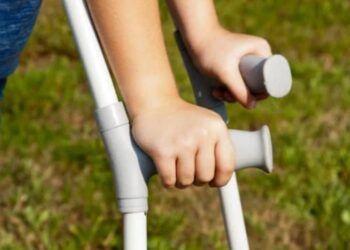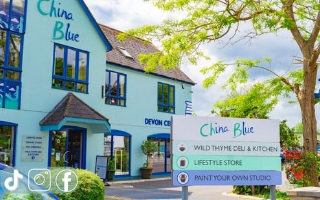Is South Devon still Christian?
It looks like older residents believe it is while millenials – those aged 18-24 – feel that times have changed. Under a third of millennials now describe Britain as a Christian country. And more than four in 10 of these young men and women said Britain is a country with no specific religious identity. They do, however, believe that religion plays an important role in the lives of individuals.
The survey was carried out by pollsters ComRes and is being published to mark the launch of the new faith Research Centre later this month. They interviewed 2,048 British adults online between January 4 and 5.
Half of millennials said UK politicians and policy-makers should have a good understanding of religion, and that understanding religion “is important to tackling terrorism around the world”.
Age, however, played a real difference in what people believed. “In some of the questions we asked, adults aged between 18-24 and adults aged 65+ answered at opposite ends of the scale, indicating marked differences between generations in perceptions of religion and belief,” said Katie Harrison, director of the new Faith Research Centre.
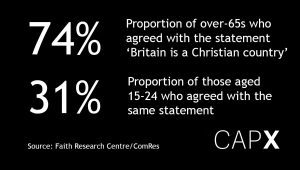 There’s other evidence to suggest a recent change in the beliefs and behaviour of local people. Last year the number of people attending Church of England services each week dropped below 1 million for the first time – accounting for less than 2% of the population – with Sunday attendances falling to 760,000. Both the Anglican and Catholic churches are struggling to retain people brought up as Christians. Four out of ten adults raised as Anglican – and a similar number of those raised Catholic – now identify as having no religion.
There’s other evidence to suggest a recent change in the beliefs and behaviour of local people. Last year the number of people attending Church of England services each week dropped below 1 million for the first time – accounting for less than 2% of the population – with Sunday attendances falling to 760,000. Both the Anglican and Catholic churches are struggling to retain people brought up as Christians. Four out of ten adults raised as Anglican – and a similar number of those raised Catholic – now identify as having no religion.
The Church of England expects attendance to continue to fall for another 30 years as its congregations age and younger generations reject and question organised faith. Christian churches are also generally failing to attract new recruits from atheist or agnostic backgrounds – the vast majority of converts to the mainstream churches come from other Christian denominations.
We appear to be seeing the rise of the ‘Nones’, people who say they they have ‘No Religion’ when asked. The Nones aren’t a cohesive group, however. Some are avowed atheists, others are agnostic, many simply don’t want to state a preference, some just don’t care at all, while there may be many with less-easily defined spiritual beliefs.
The reasons for this rapid change aren’t clear. One suggestion is the increasing involvement of women in the workforce. Around the world women are more likely to be religious than men, though that changes when women have more opportunities – when women join the labour force they become more like men in their beliefs about the existence of God.
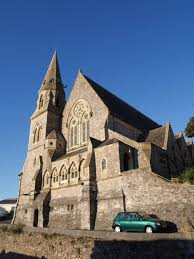 It may also be that people become Nones due to financial security. European countries with a stronger social safety net are more secular than the United States, for instance, where poverty is more common and a medical emergency can cause bankruptcy. Atheism is also tied to education with non-believers often having a college or university level degree. Additionally, secularization seems linked with internet use. As access to the web, allowing information sharing and communication, becomes more common across the world, secularism seems likely to grow.
It may also be that people become Nones due to financial security. European countries with a stronger social safety net are more secular than the United States, for instance, where poverty is more common and a medical emergency can cause bankruptcy. Atheism is also tied to education with non-believers often having a college or university level degree. Additionally, secularization seems linked with internet use. As access to the web, allowing information sharing and communication, becomes more common across the world, secularism seems likely to grow.
It’s also possible that, as western society has become more liberal in its attitudes to equal marriage, sexual identity, contraception and abortion, the persisting conservative beliefs of some faiths appear out-of-touch with younger people in particular. Specifically, very public arguments over whether gay people should be allowed to marry and whether women should be priests possibly caused lasting damage to the image of the established Church.
This change may well continue in Britain. In the past the primary source of new believers would be through the family – religious parents raised religious children. Now with the rise of the Nones, children are less likely to be exposed to religious views of the world.
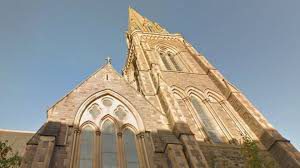 This change appears to be also happening in South Devon, but possibly less rapidly than other parts of the country. In the 2011 Census everyone in the UK was asked their religion – the results for Torbay are shown below. The main difference between us and the rest of the UK was that we had a slightly higher proportion of Christians at 61%, in comparison with the national average at 59%. This is probably down to our aging population – the rest of England is, in terms of age, where Torbay was in 1980.
This change appears to be also happening in South Devon, but possibly less rapidly than other parts of the country. In the 2011 Census everyone in the UK was asked their religion – the results for Torbay are shown below. The main difference between us and the rest of the UK was that we had a slightly higher proportion of Christians at 61%, in comparison with the national average at 59%. This is probably down to our aging population – the rest of England is, in terms of age, where Torbay was in 1980.
Age is also linked to where religious believers live. A closer look at the Bay reveals that, for example, Cockington and Chelston had almost 50% non-believers, while more affluent and elderly Wellswood had 15%. We also had smaller numbers of Muslims – the only parts of the Bay with the national average number of Muslims was around Torbay Hospital, indicating the contribution of Muslim health workers.
If we take the national research and apply it to the Bay, there will have been a decrease in the numbers of Christians in the past 6 years since the Census was taken. At a 2% annual decrease it’s reasonable to say that the majority of those of us living in South Devon would now describe ourselves as having no religion. This is the first time we haven’t had a majority Christian population for well over a thousand years.
Who we were in Torbay – the 2011 Census
Christian 82,924
No Religion 35,535
Religion not stated 10,110
Muslim 521
Jedi Knight 500
Buddhist 389
Spiritualist 246
Pagan 177
Hindu 128
Jewish 109
Mixed religion 70
Sikh 41
Wicca 40Spiritual 36
Taoist 11
Rastafarian 9
Pantheism 7
Own belief system 6
Universalist 6
Witchcraft 4
Deist 3
Baha’i 5
Satanism 5
New Age 4
Scientology 3
Heathen 3
Native American Church 2
You can join us on our social media pages, follow us on Facebook or Twitter and keep up to date with whats going on in South Devon. Got a news story, blog or press release that you’d like to share? Contact us








